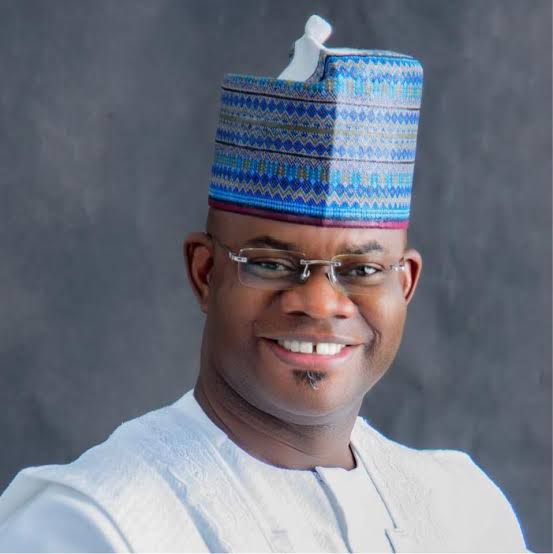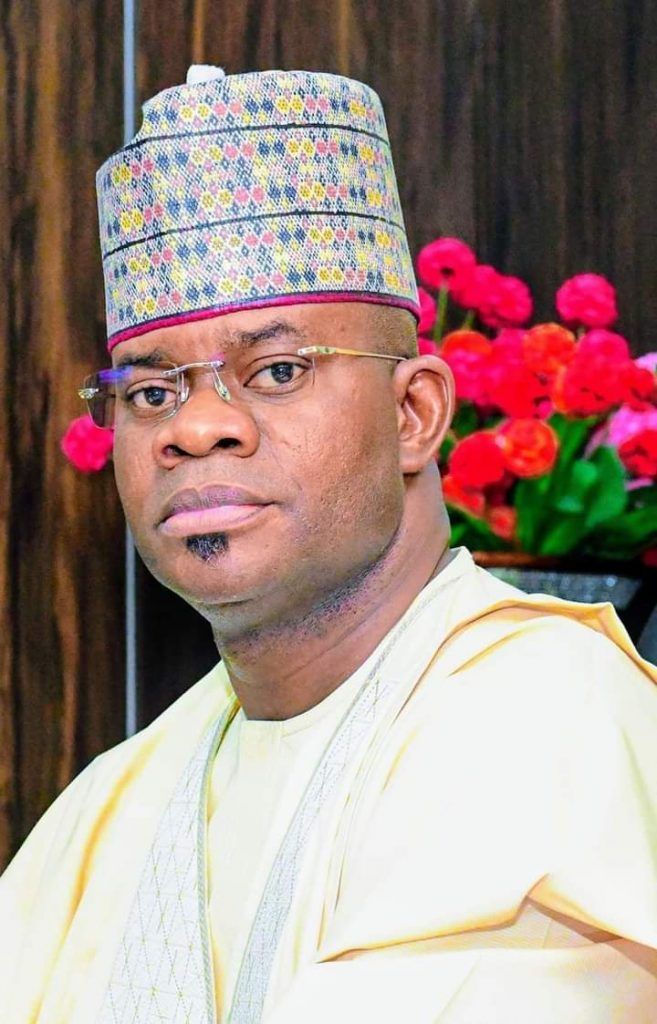BEING TEXT OF A KEYNOTE ADDRESS PRESENTED BY HIS EXCELLENCY, GOVERNOR YAHAYA BELLO OF KOGI STATE, REPRESENTED BY BARR. MOSES OKEZIE-OKAFOR, THE DIRECTOR-GENERAL, RESEARCH AND DEVELOPMENT, KOGI STATE AT A NATIONAL SYMPOSIUM CONVENED BY CHIEF MRS. FOLASHADE TINUBU UNDER THE AEGIS OF THE NIGERIA DIASPORA FOR ASÍWÁJÚ GROUP AT NICON LUXURY HOTEL ABUJA ON THURSDAY 27THJULY, 2023
The Distinguished Convener, Chief Mrs. Folashade Tinubu, Iyaloja-General of Nigeria and beloved daughter of His Excellency, President Bola Ahmed Tinubu, GCFR, the Leadership and Membership of the Nigeria Diaspora for Tinubu Group, distinguished guests, fellow Nigerians, ladies and gentlemen, all other protocols fully and duly observed.
When I was invited to deliver the keynote address speech at this national symposium I hastened to oblige because the topic -‘The Japa Syndrome and Its Effects on Nation-building’ -is of utmost importance to our beloved country. I have tried to make this as well-researched, engaging, and thought-provoking as possible. I believe that together, we can delve into the heart of this critical issue and explore potential solutions for a brighter future for our nation and people.
Defining Key Concepts
Before diving deeper into the topic, let us first clarify some key concepts:
‘Japa’ is a Yoruba word that has been variously transliterated as ‘to run, to flee, or to escape’. It is now a national slang for a widespread form of neo-culturalism comprising beliefs, values and practices which drive citizens ‘to leave Nigeria for greener pastures abroad.’
In the context of the worrisome form of emigration we are discussing today, it refers to the increasing trend of Nigerian youths leaving the country in search of better opportunities abroad. This phenomenon is deeply rooted in a range of frustrations and challenges faced by the Nigerian populace, particularly the youths.
The other concept we should get a grasp on before proceeding is ‘nation-building’. It means many things to many people, some good and some bizarre, but during my research I synthesized a definition I find very compact and functional. To me:
‘Nation-building refers to the intentional and collective process of constructing and shaping a cohesive and united nation-state with a shared identity, common values, and a strong sense of national pride. It involves fostering social cohesion, promoting economic development, strengthening institutions, and cultivating a sense of belonging among citizens, irrespective of their diverse backgrounds, in order to build a stable, prosperous, and harmonious society.’
Causes of the Japa Syndrome
1. Economic Hardship: One of the primary causes of the Japa Syndrome is economic hardship and limited opportunities for personal growth and development within the country. Many young Nigerians feel discouraged by the high levels of unemployment and the inability to secure stable and well-paying jobs that can provide a comfortable standard of living. As a result, they look to other countries with more robust economies and better prospects for professional growth.
2. Lack of Basic Amenities: The inadequate provision of basic amenities such as electricity, water, and healthcare contributes to the Japa Syndrome. The lack of reliable infrastructure makes daily life challenging for many Nigerians, leading them to seek better living conditions abroad.
3. Corruption and Inefficiency: Rampant corruption and inefficiency in government institutions are major deterrents for young people who seek a fair and transparent society. The perception that success is largely dependent on political connections rather than merit and hard work discourages many talented individuals from pursuing their dreams in Nigeria.
4. Inadequacies of the Educational System: The quality of education in Nigeria remains a concern, with issues such as outdated curricula, inadequate facilities, and a lack of skilled teachers. Many young people seek educational opportunities abroad to acquire the cuttingedge knowledge and skills that they feel are lacking in the Nigerian educational system.
5. Security Concerns: The prevalence of insecurity, including armed conflicts, insurgency, and kidnapping, creates an environment of fear and uncertainty. As a result, young Nigerians often seek safer havens abroad, where they can pursue their ambitions without the constant threat of violence.
6. Political Instability: Politics in Nigeria and politicians generally are widely distrusted by citizens. Perceptions of incompetence and even deliberate misconduct by government leadership has over the years bred instability in governance. This has in turn resulted in a lack of confidence in Nigerian leadership and her ability to steer the ship of state to safe harbour. This uncertainty prompts many young people to consider leaving the country in search of better prospects overseas.
7. Perception of Limited Social Mobility: Nigeria is a hugely diverse nation which has, sadly, experienced franchised and sustained mismanagement of her diversity. The perception that social mobility is limited based on factors like ethnicity, religion, or socioeconomic background has become ubiquitous, leading to frustration and disillusionment among young Nigerians. This belief has driven many of our youth to seek better opportunities outside Nigeria, where they believe merit and hard work are more likely to be rewarded.
8. Desire for Exposure and Global Experience: Some young Nigerians are driven by the desire for exposure to different cultures, experiences and opportunities. They see the chance to travel or live in foreign countries as a way to broaden their horizons and gain a global perspective.
9. Influence of Social Media and Mass Media: The influence of social media and mass media also plays a role in the Japa Syndrome. The portrayal of success stories and opportunities abroad in movies, television, and online platforms can create a perception that life outside Nigeria is significantly better.
10. Erosion of Trust in Government and Her Institutions: A growing erosion of trust in government institutions and policies due to corruption, maladministration, misfeasance and downright incompetence has severely eroded citizens’ faith in the nation’s ability to provide a conducive environment for personal, family, even organizational, economic growth. This lack of trust has pushed Nigerians, young and old alike, to seek greener pastures abroad.
Negative Effects of the Japa Syndrome
1. Brain Drain: One of the most significant negative effects of mass migration is brain drain. Skilled and talented individuals, including doctors, nurses, engineers, and educators, are leaving the country in search of better opportunities elsewhere. This exodus depletes the nation’s human capital and hampers its growth and development.
Brain drain is not a new concept, but its implications are more profound in the context of today’s Nigeria. Our nation has invested heavily in the education and training of these professionals, only to see them depart for countries offering better remuneration, working conditions, and professional development opportunities. As a result, our healthcare system, education sector, and other critical industries suffer due to a shortage of skilled and experienced personnel. Addressing this issue requires a multi-faceted approach that involves incentives to retain talent, improving working conditions, and creating an environment that fosters professional growth and innovation.
2. Loss of Investors’ Confidence: The mass migration of Nigerians also sends a negative signal to potential foreign investors. They may be discouraged from investing in a country perceived as losing its skilled workforce and facing a shortage of competent professionals.
Investor confidence is essential for any nation’s economic growth and development. When foreign investors perceive Nigeria as a country losing its human capital and facing a talent drain, they hesitate to invest in the country. We have already seen several years of reduced foreign direct investments with the resultant hampering of economic progress and limiting of job creation opportunities in our economy.
Western industrial powerhouses outsource much of their manufacturing and ancillary economic activities to Asia and Asia in general not just because they have a workforce, but more because they have a skilled workforce. To rebuild investors’ confidence, Nigeria must demonstrate her commitment to retaining and developing our skilled workforce. This involves not only addressing the brain drain issue but also improving governance, transparency, and the overall business environment.
3. Low Economic Productivity: When a significant portion of the productive population leaves, countries inevitably experience lower economic productivity, as experienced and skilled hands are scarce and fewer people contribute to manufacturing and other productive sectors of the economy.
Economic productivity is a critical driver of any nation’s prosperity. When skilled individuals leave the country, sectors such as healthcare, technology, engineering, and education suffer from a lack of expertise. This not only hinders sector-specific progress but also has a ripple effect on the entire economy. To enhance economic productivity, the Nigerian government must prioritize policies that foster innovation, entrepreneurship, and investment in key sectors. Furthermore, creating an enabling environment for businesses, particularly startups, will encourage job creation and economic diversification.
4. Negative Perception About the Country: The phenomenon of mass migration can lead to negative perceptions about Nigeria as a country. It may reinforce stereotypes that suggest Nigerians have no hope in their homeland and must leave to have a better life.
Perception matters significantly in the global community. When the international community perceives Nigeria as a country that cannot retain its skilled workforce, it can lead to a decrease in foreign investment and hinder diplomatic relationships. It is essential to counter these negative perceptions by showcasing the successes of Nigerians who have remained in the country and contributed significantly to its growth and development. By highlighting our nation’s potential and achievements, we can challenge stereotypes and change the narrative surrounding Nigeria.
5. Increased Cases of Errors and Deaths: In critical sectors like healthcare, the departure of experienced professionals can lead to an increase in medical errors, potentially resulting in loss of lives.
The healthcare sector is particularly vulnerable to the Japa Syndrome’s negative effects. As experienced doctors, nurses, and medical professionals leave, the quality of healthcare may suffer, leading to medical errors and preventable deaths. To address this issue, the government must prioritize the healthcare sector’s improvement, offering competitive remuneration, better working conditions, and continuous professional development opportunities.
Additionally, investing in the training and development of new medical professionals is vital to ensure a sustainable healthcare system.
The Few Positives of the Japa Syndrome
While the negatives of the Japa Syndrome are numerous and disquieting, it is essential to acknowledge that there are a few positives, particularly when looking at the successes of Nigerian youths in the Diaspora. Some Nigerians have excelled in various fields, such as fintech, music, and movie production, contributing to the global community and showcasing Nigeria’s talent and potential.
The Nigerian diaspora, with its vast talent pool and entrepreneurial spirit, has made significant contributions to various sectors worldwide. Many of our compatriots have achieved success and recognition on the international stage, becoming ambassadors for Nigeria’s potential. Harnessing this talent and creating avenues for collaboration between the diaspora and the nation can lead to a win-win situation. Diaspora remittances can also play a significant role in supporting the country’s economy and social development initiatives.
Stemming the Tide of Japa Syndrome
It is not enough to bemoan the adverse impact of the Japa Syndrome on our nation and people, but it is also imperative that we seek to proffer solutions. In my opinion, to address the Japa Syndrome and its negative effects on nation-building, we must take a multi-faceted approach. The Nigerian government, alongside its foreign allies, can work together to implement the following strategies:
1. Invest in Education: To raise and retain young talents, the Nigerian government must prioritize education and improve both affordability and quality. Modernize curricula to equip students with relevant skills, eliminate disruptions to the academic calendars, encourage innovation, and promote problem-solving.
Education is the foundation of a nation’s progress. By providing quality education and fostering a culture of innovation, we can equip our youth with the skills needed to drive economic growth and development. The curriculum must be continuously updated to align with the demands of the evolving job market and emerging industries. Additionally, providing scholarships, grants, and other financial incentives can attract and retain top talents in the country. In this regard, the truly innovative students loan initiative of the Federal Government is commended.
2. Promote Youth Empowerment: We can never invest too much in our youth. We must create an enabling environment for businesses to thrive, especially startups. Thus, we must go beyond handouts to pioneer enterprise through empowerment programs that provide funding, mentorship, and support to young entrepreneurs.
Youth empowerment is vital for creating a vibrant and innovative economy. The government should actively support and invest in entrepreneurship and small businesses, providing access to funding, mentorship, and networking opportunities. Creating innovation hubs and technology parks can foster collaboration and knowledge exchange among young entrepreneurs. By nurturing a culture of entrepreneurship and supporting startups, we can inspire the next generation of Nigerian leaders and job creators.
3. Tackle Unemployment and Poverty: The three tiers of Governments in Nigeria must prioritize job creation and tackle poverty head-on through targeted social intervention programs. We have to incubate initiatives that focus on vocational training and skill development.
Unemployment and poverty are among the leading drivers of the Japa Syndrome. To address these issues, the government must prioritize job creation and establish targeted social intervention programs that provide support to vulnerable populations. Vocational training programs that equip individuals with marketable skills can create a skilled workforce and reduce unemployment rates. Moreover, encouraging private sector investments in labor-intensive industries can create more job opportunities for the youth.
4. Improve Healthcare System: Nigeria has to invest more in her healthcare sector in order to retain medical professionals and attract foreign investors. This is to ensure better working conditions, competitive remuneration, and access to modern medical facilities.
The healthcare sector is the backbone of any nation’s well-being, and investing in it is crucial to our nation’s development. By improving working conditions and offering competitive remuneration to medical professionals, we can create an environment that motivates them to stay and serve their fellow citizens. Additionally, enhancing access to modern medical facilities and advanced technologies will not only retain skilled healthcare workers but also attract foreign investors interested in contributing to the sector’s growth.
Furthermore, investing in medical research and development will strengthen Nigeria’s position in the global healthcare landscape. It will enable us to tackle prevalent diseases, promote preventive healthcare, and develop indigenous medical solutions. Collaborating with international partners and leveraging the expertise of the Nigerian diaspora in the healthcare field will open up opportunities for knowledge transfer and innovative healthcare solutions.
5. Strengthen Security and Rule of Law: Address the rising insecurity in the country through effective law enforcement and improved intelligence gathering. A secure environment will inspire confidence in citizens to stay and invest.
Insecurity is a significant concern affecting Nigeria, and it is essential to address this issue for the country’s stability and progress. A secure and stable environment will encourage young Nigerians to stay and actively participate in nation-building.
The government must prioritize law enforcement efforts to combat crime and insurgency effectively. Investing in intelligence gathering and modern technology will improve security agencies’ capabilities to prevent and respond to security threats promptly.
Moreover, the government should foster community engagement and collaboration with local leaders to address the root causes of insecurity. By understanding and addressing the underlying issues, we can create an atmosphere of trust between citizens and law enforcement agencies, leading to a safer and more stable Nigeria.
Action Steps for the Federal Government of Nigeria
I have been the youngest Governor in Nigeria since 2016 when I first took the Oath of Office. I desire to see a new crop of savvy young Nigerians rise to man the helm of affairs in States across the country under the tutelage of the Jagaban himself, His Excellency, Asíwájú Bola Ahmed Tinubu, GCFR. Here are some action steps that the Federal Government of Nigeria can take under his leadership to rebuild the confidence of young Nigerians in their country.
1. Champion Economic Reforms: Initiate and support economic reforms that promote a conducive business environment, encourage foreign direct investment, and stimulate economic growth and diversification.
Economic reforms play a pivotal role in creating a favorable business environment that attracts both local and foreign investments. The government must enact policies that reduce bureaucracy, streamline business registration processes, and ensure transparency in economic activities. Providing tax incentives for startups and small businesses can encourage entrepreneurship and spur economic growth. Additionally, investing in critical sectors such as agriculture, manufacturing, and technology will diversify the economy and create employment opportunities for the youth.
2. Prioritize Infrastructure Development: Invest in critical infrastructure projects to enhance productivity and improve the overall quality of life for citizens.
Infrastructure development is essential for economic growth and social development. The government should prioritize investments in transportation, energy, healthcare facilities, and educational institutions. Improving transportation networks will facilitate the movement of goods and people, thereby boosting trade and productivity. Reliable energy supply is crucial for industrial growth and attracting foreign investments. Moreover, investing in healthcare and educational infrastructure will enhance the overall well-being and human capital development of the nation.
3. Improve Governance and Transparency: Commit to transparent and accountable governance, eradicating corruption, and ensuring that the government’s actions align with the best interests of the citizens.
Transparency and good governance are fundamental pillars of a thriving democracy. The government must prioritize transparency in decision-making processes, ensure the rule of law is upheld, and hold public officials accountable for their actions. Creating an environment that discourages corruption will build citizens’ trust in the government and create an atmosphere conducive to investment and growth. Moreover, involving citizens in policy-making processes through increased public participation will ensure that policies reflect the needs and aspirations of the Nigerian people.
4. Foster Collaboration with Diaspora Nigerians: Engage with Nigerians in the Diaspora to harness their skills, expertise, and resources for the development of the nation.
The Nigerian diaspora holds immense potential as a valuable resource for nation-building. Engaging with them and creating platforms for collaboration will facilitate knowledge transfer, technology exchange, and investment in Nigeria. The government should establish a diaspora engagement framework to leverage the skills and resources of Nigerians living abroad. Additionally, initiatives that enable the diaspora to participate in developmental projects and investment opportunities in their home country will strengthen their connection with Nigeria and encourage a sense of ownership in its progress.
5. Revamp the Healthcare Sector: Implement policies that improve healthcare delivery, retain medical professionals, and ensure affordable and accessible healthcare for all citizens.
The healthcare sector requires urgent attention and investment to meet the healthcare needs of our growing population. The government should allocate adequate funding to the healthcare sector, ensuring that medical facilities are adequately equipped and healthcare professionals are motivated to remain in the country.
Implementing universal healthcare coverage will ensure that all citizens have access to affordable and quality healthcare services. Additionally, fostering public-private partnerships in the healthcare sector will enhance its efficiency and effectiveness in delivering services.
6. Support Youth Empowerment: Champion youth empowerment programs that create job opportunities and provide mentorship to nurture young talents.
Youth empowerment is pivotal for nation-building and sustainable development. The government should prioritize youth-focused programs that provide skill development, vocational training, and access to funding for entrepreneurship. Mentorship programs that pair young individuals with experienced professionals in their chosen fields can provide invaluable guidance and support. Furthermore, promoting gender equality and inclusion in these initiatives will ensure that all young Nigerians have equal opportunities to excel and contribute to the nation’s growth.
7. Promote Patriotic Values: Encourage a sense of patriotism and national pride through public awareness campaigns and education on the importance of contributing to the growth and development of Nigeria.
Patriotism and national pride are essential in fostering a sense of responsibility and ownership of Nigeria’s future. The government should invest in public awareness campaigns that promote patriotism and highlight the positive contributions of Nigerians to society.
Educational institutions should integrate civic education into the curriculum to instill a sense of civic responsibility and national identity among the youth. Furthermore, recognizing and celebrating national achievements and milestones can evoke a sense of unity and pride among citizens.
Conclusion
In conclusion, the Japa Syndrome is a real and concerning issue that demands urgent attention from all stakeholders. As we grapple with the negative effects of mass migration, we must not lose sight of the potential for positive change and transformation. With strong leadership, effective policies, and a collective commitment to nation-building, we can reverse the tide of the Japa Syndrome and rebuild the confidence of young Nigerians in their country.
I firmly believe that Nigeria’s greatest resource lies in its youth, and by empowering them, we can unlock the nation’s true potential. Let us work together, hand in hand, to build a Nigeria where our youths are proud to stay and contribute to the realization of a prosperous, united, and thriving nation.
Thank you for your attention. May God bless the Federal Republic of Nigeria.
YAHAYA BELLO
Governor of Kogi State






